Keyword research shouldn’t be conducted in a vacuum. To gain a competitive edge and have any chance of ranking well, you need to know what your competitors are doing — more specifically, you need to know what phrases they’re ranking for and the keywords they’re targeting. But how can you find out without access to their website analytics?
Here are some ways you can search a website for keywords, whether it’s your own website or a competitor’s.
What Does It Mean to Search a Website for Keywords?
Searching a website for keywords reveals the keywords that a website, or a specific webpage, is targeting. Some search methods are more fruitful than others, but the aim is to uncover keywords that you can then use in your content.
The search method you should choose depends on your goal: Do you want to find potential content topics that a competitor has covered but you haven’t? Or do you want to find the exact keyword a website has targeted for a specific topic?
Why Would You Search a Website for Keywords?
Here are some reasons you might want to search a website for potential keywords.
Track Performance
Once you know what keywords a website or page is targeting, you can then track the site’s performance. You can see how much traffic it’s getting and its ranking in search results.
Find New Keyword Ideas
Searching for keywords on a competitor’s site can reveal topics and keywords you haven’t targeted yet. This gives you a good opportunity to swoop in and gain a competitive edge. Google rewards sites that show topical authority, so covering a topic from all angles will increase your chances of ranking well in search results.
Analyze Your Competitors
Keyword research can show you how your competitors are approaching certain topics. For example, you can see how they’re grouping similar keywords or discern the search intent of individual content pieces.
Find Specific References
A keyword search on your own website can help you find things like out-of-date product references and expired offers, so you can change or update them. And searching for your product and company name on another site can help you find out-of-date mentions there, so you can get in touch and get them updated.
Find Backlink Opportunities
Securing backlinks is integral to ranking well on Google. Search for relevant keywords and topics on other websites to find potential linking opportunities. For example, if a website mentions productivity tools and you have a productivity tool, you can reach out and ask for a link.
Plug Content Gaps
There are likely some keywords you’ve missed or haven’t considered on your own site. You can search for keywords on your competitors’ websites to see what keywords you’re missing or what topics you haven’t covered but they have. This is called a content gap analysis, and it’s a great way to drive more traffic from SEO.
4 Ways to Search a Website For Keywords
There are several ways you can search a website for keywords — and some are more effective than others. Here are four techniques you can try.
1. Use Ctrl-F
Pressing Ctrl-F (or ⌘-F on an Apple keyboard) will open your browser’s Find function, so you can look for exact matches to keywords you type in. While this isn’t the most robust way to analyze your competitors or get deep into keyword clusters, it is a quick way to find outdated promos, stats, and mentions or to see how your competitors are approaching different topics.
When you activate the Find function, you’ll be able to see how many times the keyword appears on the page and toggle through each one.
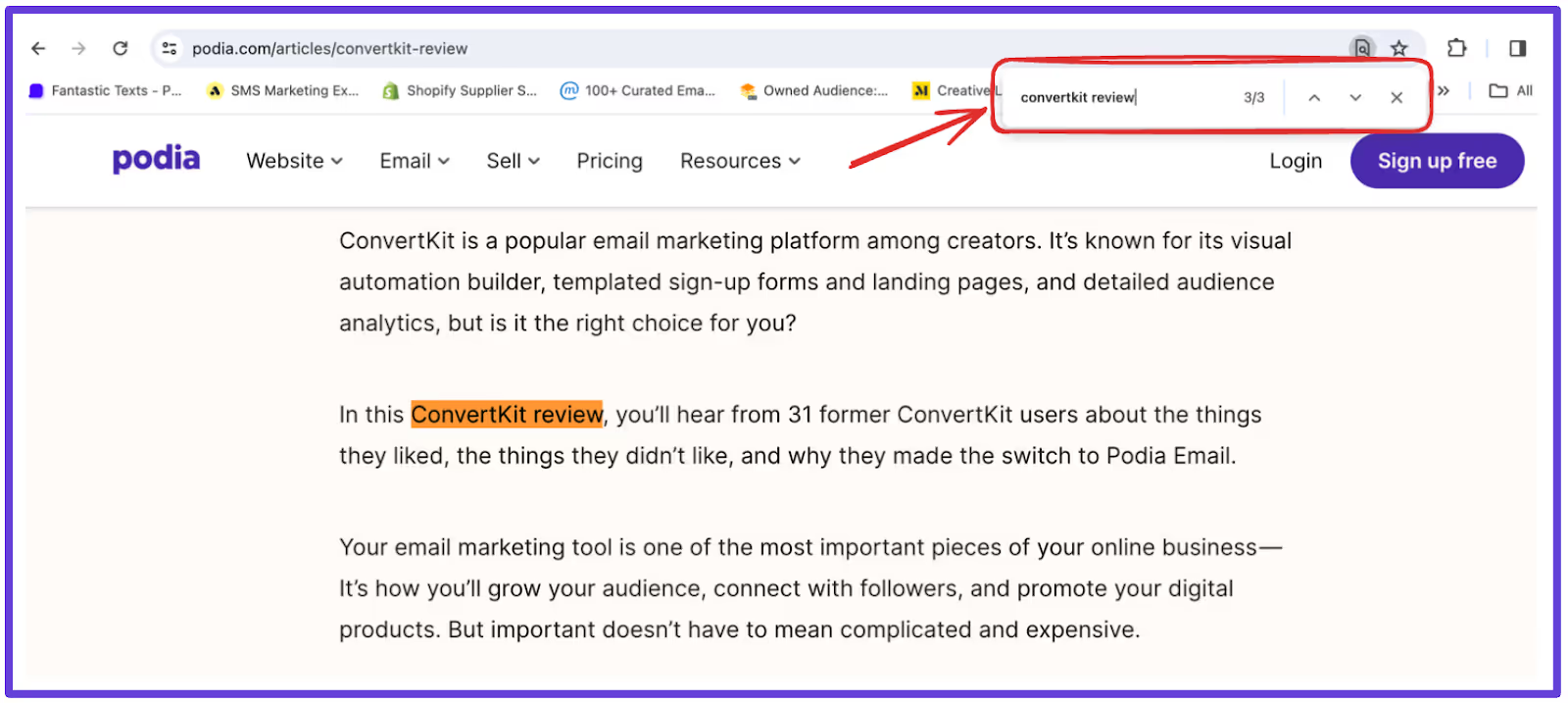
There’s a drawback to this method — you have to make your best guess as to what words to search for, which is why this is more appropriate for finding product references and specific mentions.
In the example below, I had to decide what keyword to search for. While “ConvertKit review” seems like an obvious option here, it might not be so obvious on other pages or sites. For example, the piece below looks like it’s targeting the keyword “invoicing tools,” but it could also be targeting “time tracking.”

Checking how many times a keyword is used on a page can be helpful — the more times it’s used, the likelier it is to be the main keyword. So while “invoicing tools” appears four times in this example, the phrase “time tracking” appears 14 times. This could be because it’s a more generic phrase, but it could also be a targeting tactic.
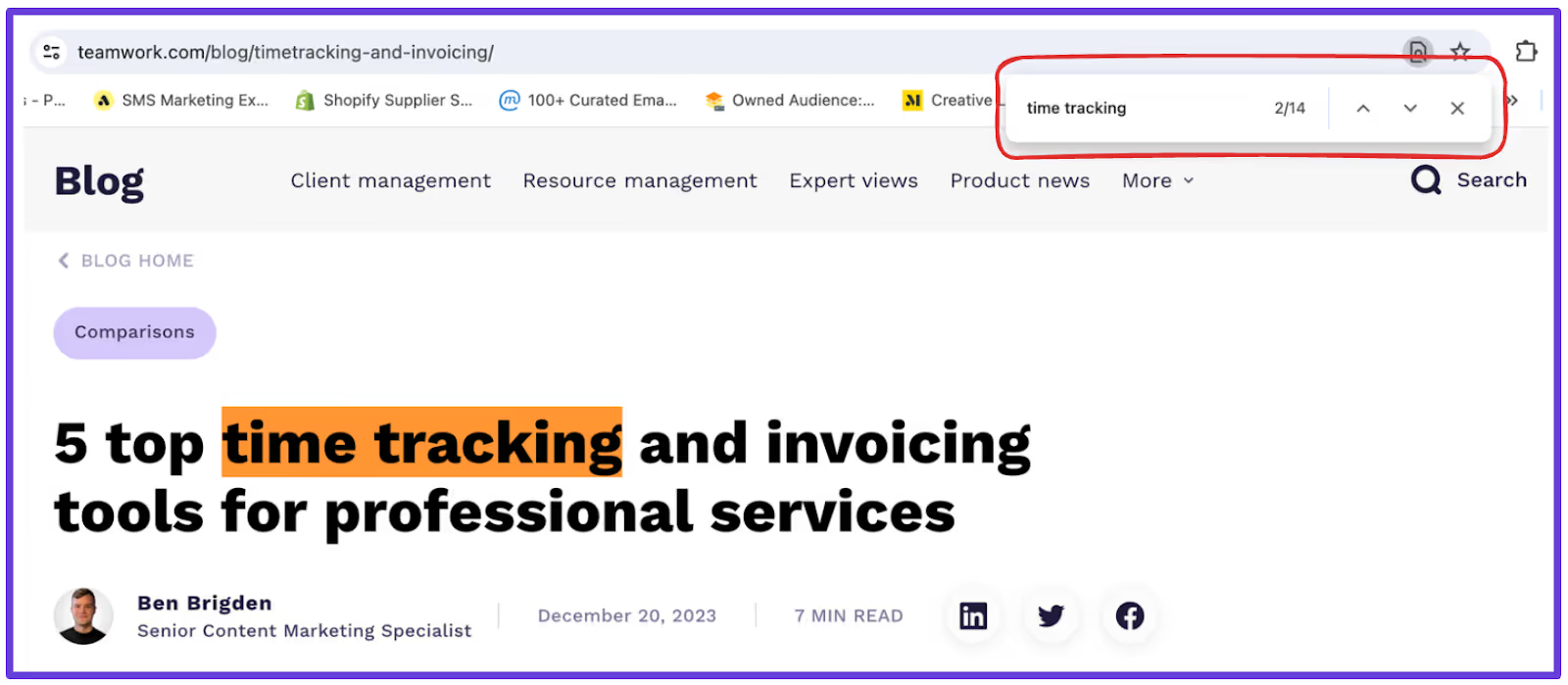
A more accurate way to discover the target keyword is to use the Find function within the source code:
- In Google Chrome, right-click or control-click on the page you want to search, and select View Page Source.
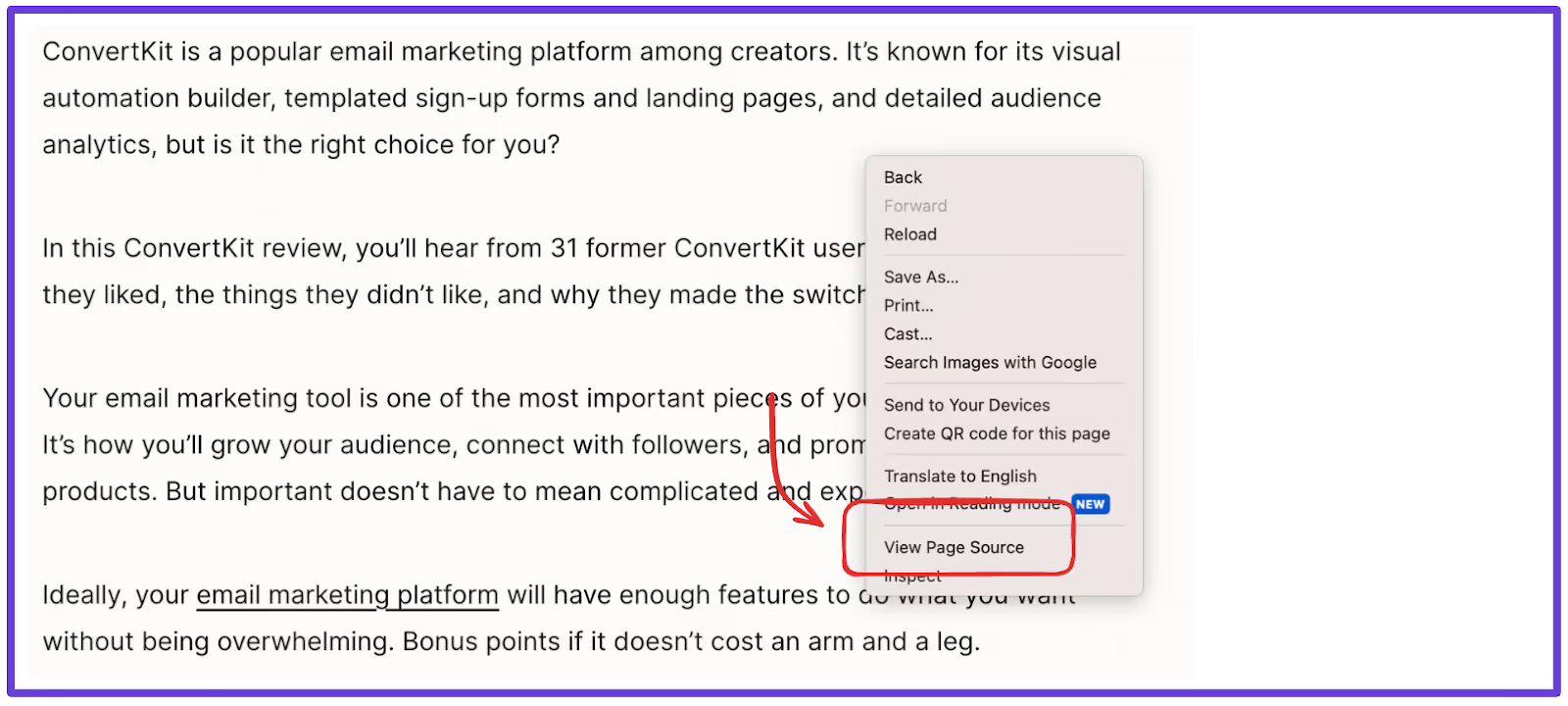
- When the window showing the page’s HTML opens, press Ctrl-F (or ⌘-F) to activate the Find feature.

- Find the <title> tag or <meta> tags to see the main keywords a page is targeting.
Keep in mind that although most webpages have the main keyword in the title tag, this isn’t always the case. Take your findings with a grain of salt, and verify using another method.
2. Use Google Search Operators
Google’s main goal is to deliver the most relevant content for every search query. Google search operators help users refine their searches to get the most accurate results possible.
You can use Google search operators to limit searches to just one website, or you can use them to find websites or pages that target a specific keyword. Here’s how:
- Type “site:” followed by the website domain you want to search (for instance, “site:www.positional.com”).
- Add the keyword you want to search after the domain (for instance, “site:www.positional.com keyword search volume”).

Notice how this search returns only 35 results, compared with a search without the Google search operators:

If you want to find pages with an exact-match keyword in the URL, you can use a different Google search operator:
- Type “site:” followed by the domain you want to search (for example, “site:www.positional.com”).
- Add “inurl:” and the keyword you want to search for after the domain (for example, “site:www.positional.com inurl:seo KPIs”).

You can also use the “inurl:” operator to identify competitor sites that are ranking for your chosen keyword. Simply leave out the “site:domain” part of the operator.
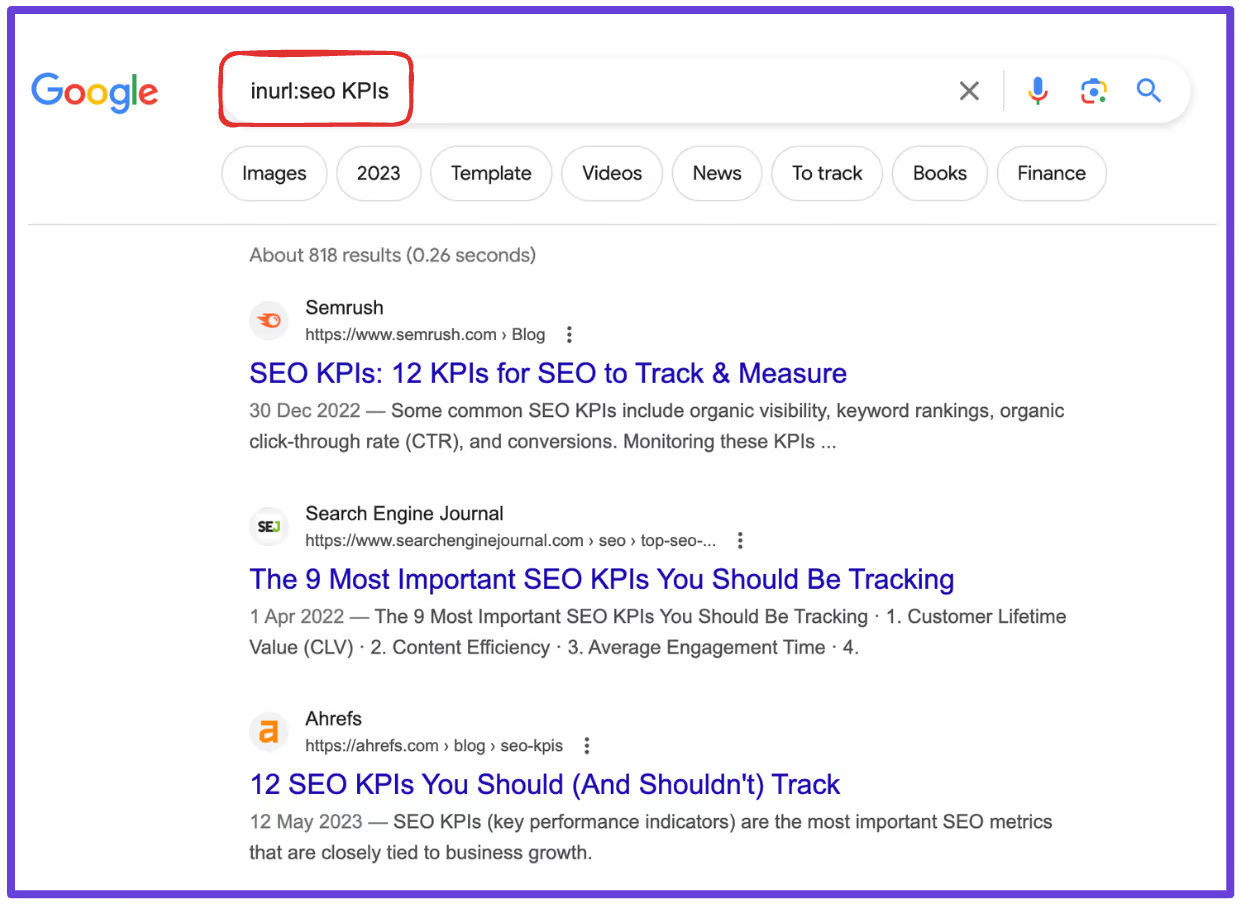
3. Use a Website’s Search Function
Most websites have their own search tools that let you run an internal search for specific content or keywords. You’ll usually find this tool in the navigation bar at the top of the page, and it’ll look like either a search bar or a magnifying glass icon.
Not every website has this type of search feature, though, and on those that do, you might find that the feature doesn’t work very well, especially if the site has a lot of content.

Start by locating the search bar, type in your chosen keyword, and hit enter.
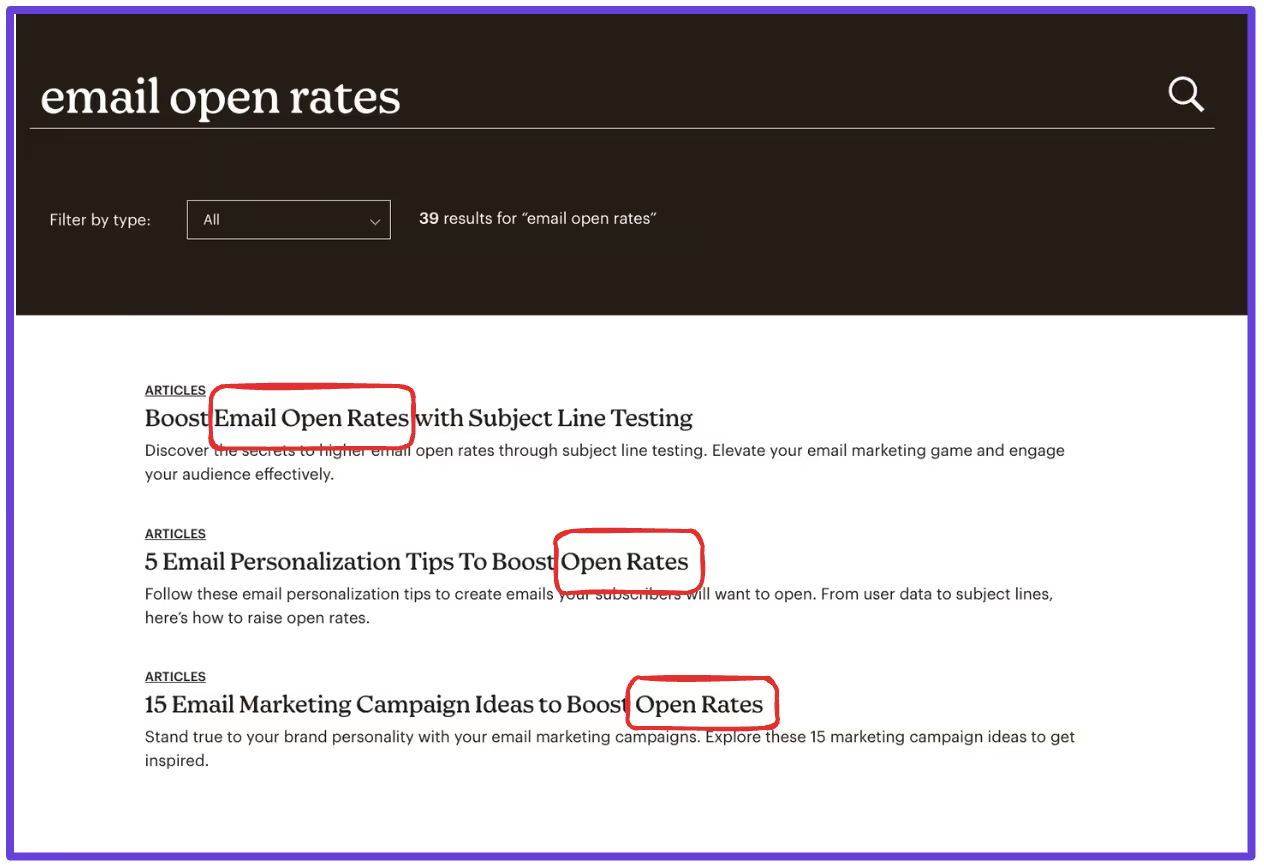
As you can see in this example from Mailchimp, you might not find an exact match, but you can explore existing content that closely relates to your chosen keyword.
4. Use Keyword Research Tools
The methods above are a great way to dip your toe into keyword research, but they rely on you knowing what keywords you want to search for. What if you aren’t sure? Or what if you want to know what keywords an individual page is ranking for without having to guess?
The answer is to use a keyword research tool.
You can use Positional’s Keyword Tracking tool to review keywords for specific websites or URLs. The tool scans your chosen URL or domain and responds with a list of keywords that it’s ranking for. You can use this list to build out your own content strategy or run several searches to find potential content gaps.
Start by entering the URL or domain you want to scan.

You’ll then be able to see the keywords the page is ranking for, the monthly search volume and difficulty score for each keyword, and the position the page or website is ranking at.
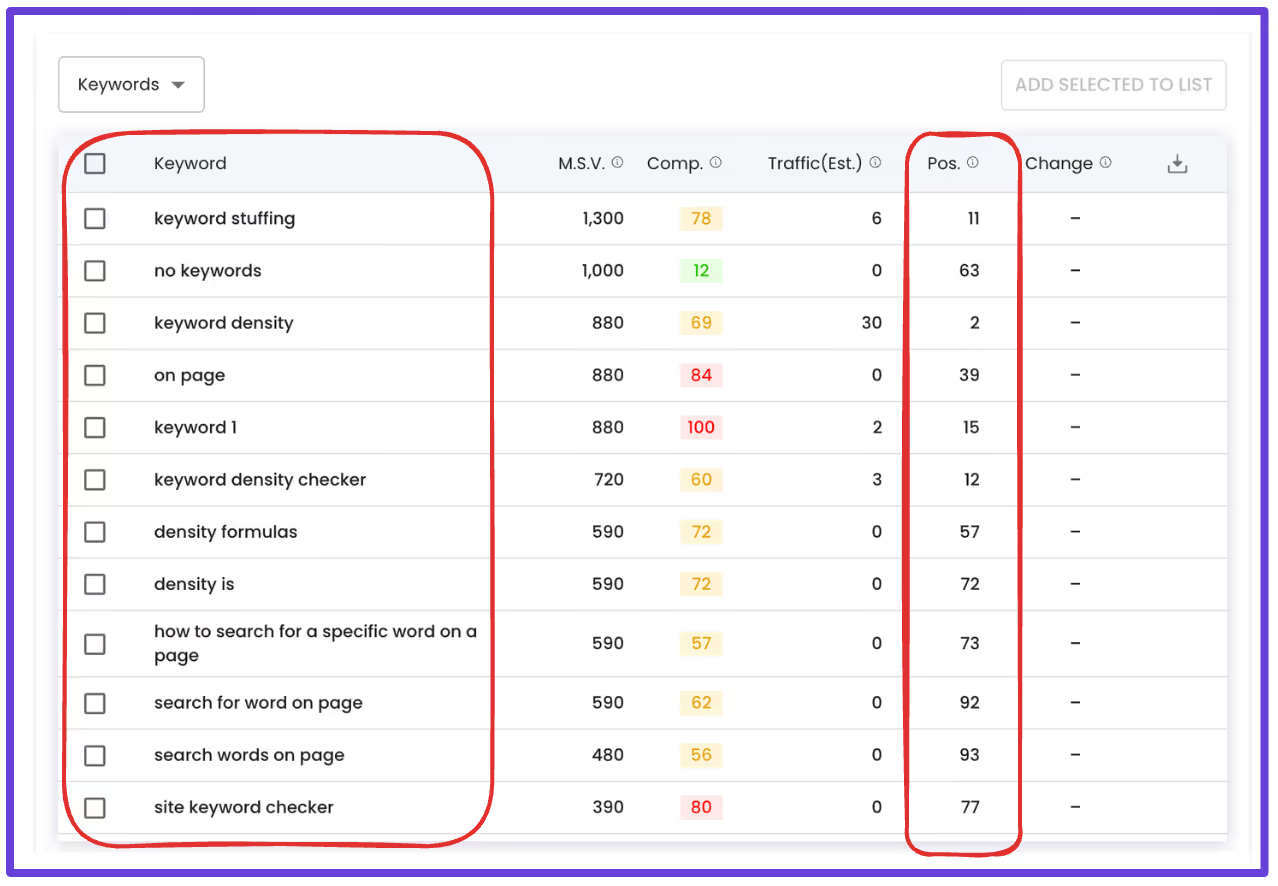
You can add any relevant keywords to a list and use them as inspiration for your own content.
Here are some alternative keyword research tools you can use:
- Semrush’s Organic Research tool will provide a list of organic keywords a site is ranking for. Just type in the URL or domain you want to scan.
- Ahrefs’ Site Explorer feature creates a list of keywords a specific domain or URL is ranking for.
How to Identify the Right Keywords to Use on Your Page
If you’ve dived in and tried these keyword research methods, you should have a list of potential keywords that’s longer than your arm. It can be tempting to try and cram them all into one piece of content, but sometimes less is more when it comes to keywords.
The important thing is to choose the right keywords to include in a piece of content. This doesn’t mean copying a competitor word-for-word or sprinkling in every single relevant word in the hopes that something will stick.
Instead, you can use Positional’s Optimize tool to discover the recommended words and phrases for each page. The tool works by identifying the keywords and topics that the top results incorporate and bringing them together in a master keyword guide.
Start by inserting your primary keyword:
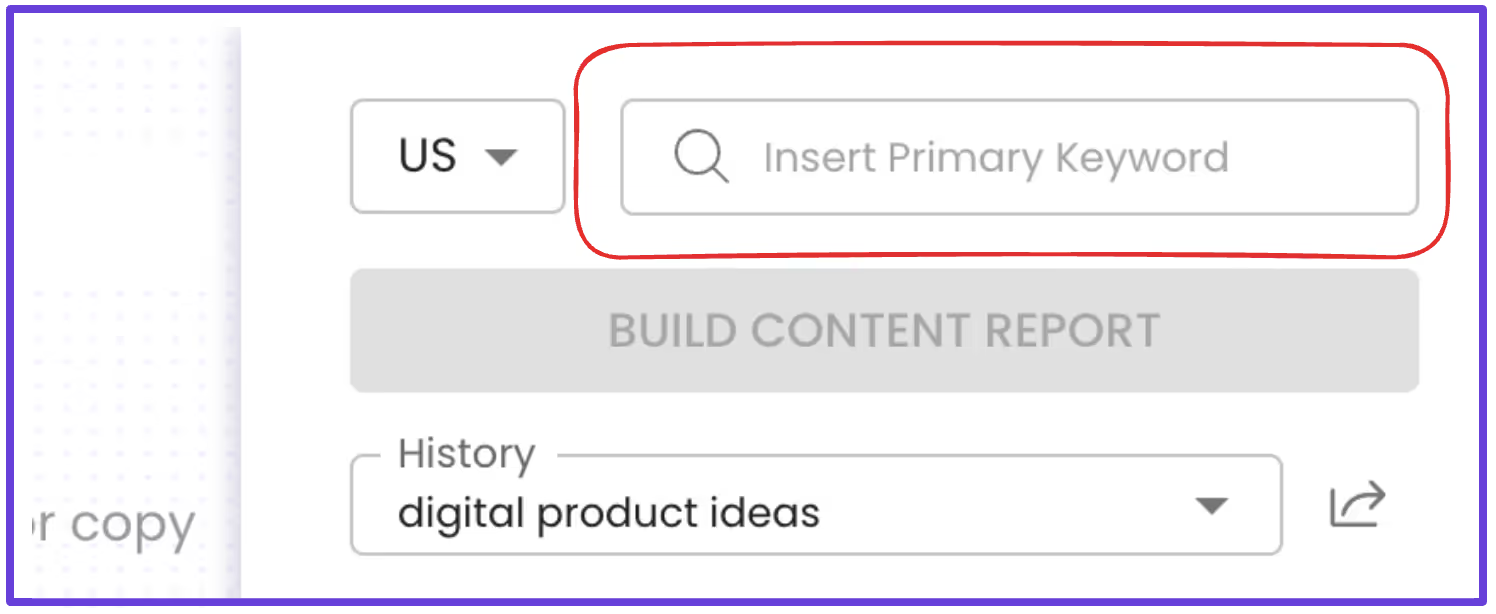
The tool will then create a list of words and phrases to include in the piece, as well as a suggestion for how many times each keyword should appear.
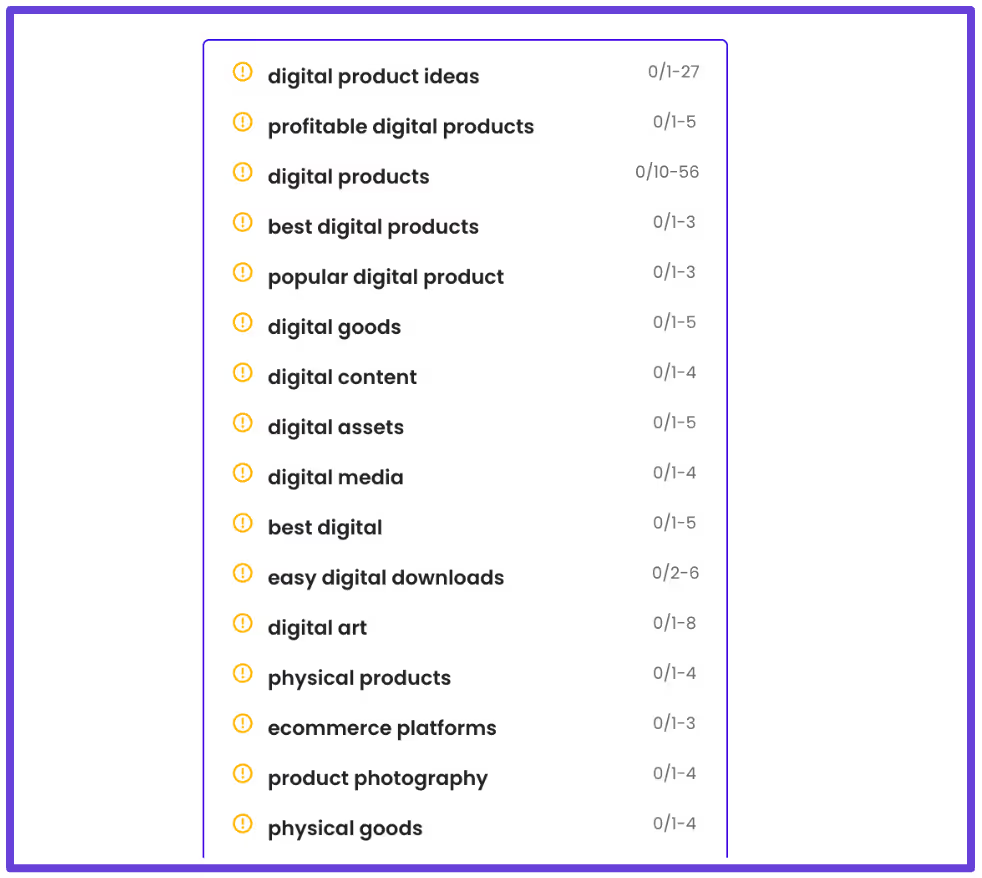
When you type your content into the tool (or copy and paste it from somewhere else), it’ll give you a score (from 1 to 100) based on several factors, including:
- The number of relevant keywords.
- The number of headers, images, and words.
- The readability of your content.
The higher the score, the better; we usually aim for a score of 60 or higher.
Alternative optimization tools include Clearscope and Surfer. Both provide keyword suggestions and score you against competitor content.
Final Thoughts
Keyword research is a core part of SEO, but where to start isn’t always clear. These search techniques provide the basics you need in order to start building a keyword list, but they can also help you make other improvements related to SEO, such as updating old references, securing backlinks, and tracking competitor performance.
The type of search you do will depend on your goal. For example, Ctrl-F can quickly find relevant mentions and exact phrases, but it relies on your existing knowledge. What it can’t do is show you what keywords a page is targeting. Instead, you need to dig deeper and use a keyword research tool. Positional’s Keyword Tracker uses powerful software to crawl a URL or domain and discover the keywords it’s ranking for. You can then create a list of potential keywords for your own site, identify potential content gaps, and track the performance of existing keywords.





